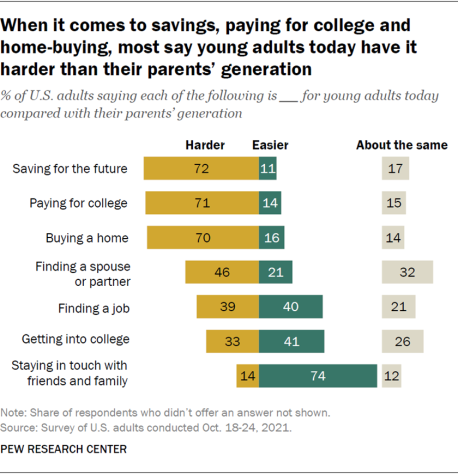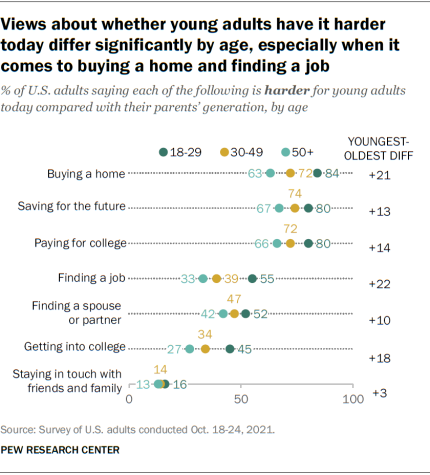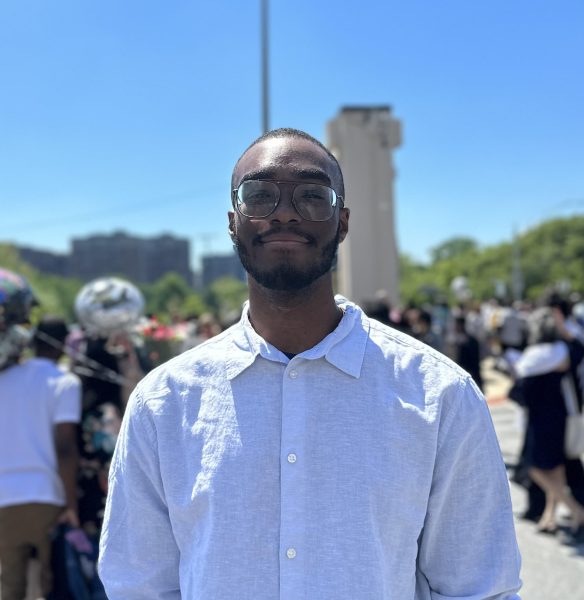Study Says Most Young Adults Believe They Face More Challenges Than Previous Generations
About seven in ten young adults in the United States today say that they face more challenges and issues in their current generation than the other previous generation, according to a recent study conducted by the Pew Research Center published in February.
The research study concluded that an overwhelming majority of young adults believe it’s harder in the modern world to save money for their future, pay their college tuition costs, buy a home, and find a significant other than it was decades earlier.
The study backed up many young adults’ claims by bringing up the fact that over the past decade, there has been a surge in the number of college graduates in severe debt and the cost of living during the housing crisis.
Victoria Rickard, a senior at Mercy College majoring in behavioral science and education, is not surprised about these findings in the slightest.
“There are many struggles that our generation had to face, which our parents did not,” Rickard explained. “We grew up in a different era than our parents did and I believe that these challenges have caused many issues that young people have faced today. For example, many young people are very vocal about mental health, whereas our parents don’t see it as a problem because of how they were raised.”
Rickard continued by stating that she believes these socio-economic struggles that many in the current modern generation are forced to live under might have taken their toll on our overall mental health.
“A struggle that we all faced and none of us were prepared for was the pandemic. We were all forced to stay home. I think the result of this made us more aware of our mental health and it decreased some of our social skills.”
 Rickard also offered her options on the survey’s discovery that “overall, 55 percent of 18- to 29-year-olds say finding a job is harder for young adults today than it was for their parents’ generation.”
Rickard also offered her options on the survey’s discovery that “overall, 55 percent of 18- to 29-year-olds say finding a job is harder for young adults today than it was for their parents’ generation.”
She agrees with this finding and believes that most in Generation Z don’t see themselves being fulfilled in the typical nine-to-five career and that desire to not have that is where the challenge comes in.
“They would rather work a two to three-hour job, or even every other day. When to keep that career all depends. If you enjoy what you do then you’re most likely to keep it, whereas if you don’t like the career, you’re stuck with it.”
Cheyenne Garcia, another Mercy College student and sophomore health science major, agrees with this statement.
“Some people get bored or tired of the career that they have and leave it. or some people want to explore other opportunities or have a different interest than before.”
She also discussed the inherent differences between previous generations and the generation of Gen Z.
“[Gen Z] go through things in their lives and challenges that their parents may not have gone through. which leaves most parents not knowing how to approach that challenge or situation…my mother had more freedom and was left alone to figure out a lot of stuff by herself, compared to me a lot of stuff goes on in life differently. I tend to lean on my parents for advice and guidance.”
Garcia did also point out that our generation is privileged in some areas. “There’s a lot more resources that we have than previous generations.”
The Pew study also addressed this. Their findings show that a large majority of Americans hold the belief that it’s easier for younger generations to both keep in touch with friends and family, find a job, and get accepted into college.
 When Rickard was asked about the lifestyle and world of her parent’s generation, she answered by explaining that “my parents grew up in a carefree environment and they were able to do whatever they wanted. Whereas I grew up in this protected environment, where my parents wanted to know who I was going out with, when I was coming home, and where I was going.”
When Rickard was asked about the lifestyle and world of her parent’s generation, she answered by explaining that “my parents grew up in a carefree environment and they were able to do whatever they wanted. Whereas I grew up in this protected environment, where my parents wanted to know who I was going out with, when I was coming home, and where I was going.”
She also pointed out the fact that climate change has had a significant impact on the modern generation. Something that the previous generation had the luxury of ignoring.
“There are many struggles that our generation had to face, which our parents did not. To name a few there is climate change, paying for college, and of course the pandemic of last year. I know when it comes to climate change, some people are very passionate about protecting the earth for future generations.”
Rickard went on to discuss the survey’s findings that many say it’s harder to find a partner or spouse in the modern dating scene.
“There are some people who would just rather date and not get married. Then some people say no I’m looking for the right person, and that could take years. There are only a few people who want to date and get married down the line, but they are still trying to figure out if this is what they want.”
However, Rickard said that even if a person believes that they have found the “one,” they will most likely be scared of the idea of commitment or having to open themselves up to someone.
“I think we all build this guard around ourselves, that when it comes to finding someone we don’t let them in, because we are scared about the result. I can tell you right now, that no one wants their heart broken. So this guard protects us from it.”

Maleek Munroe is a senior at Mercy College, majoring in communications. He graduated Nyack High School, where he found his love and passion for both...








